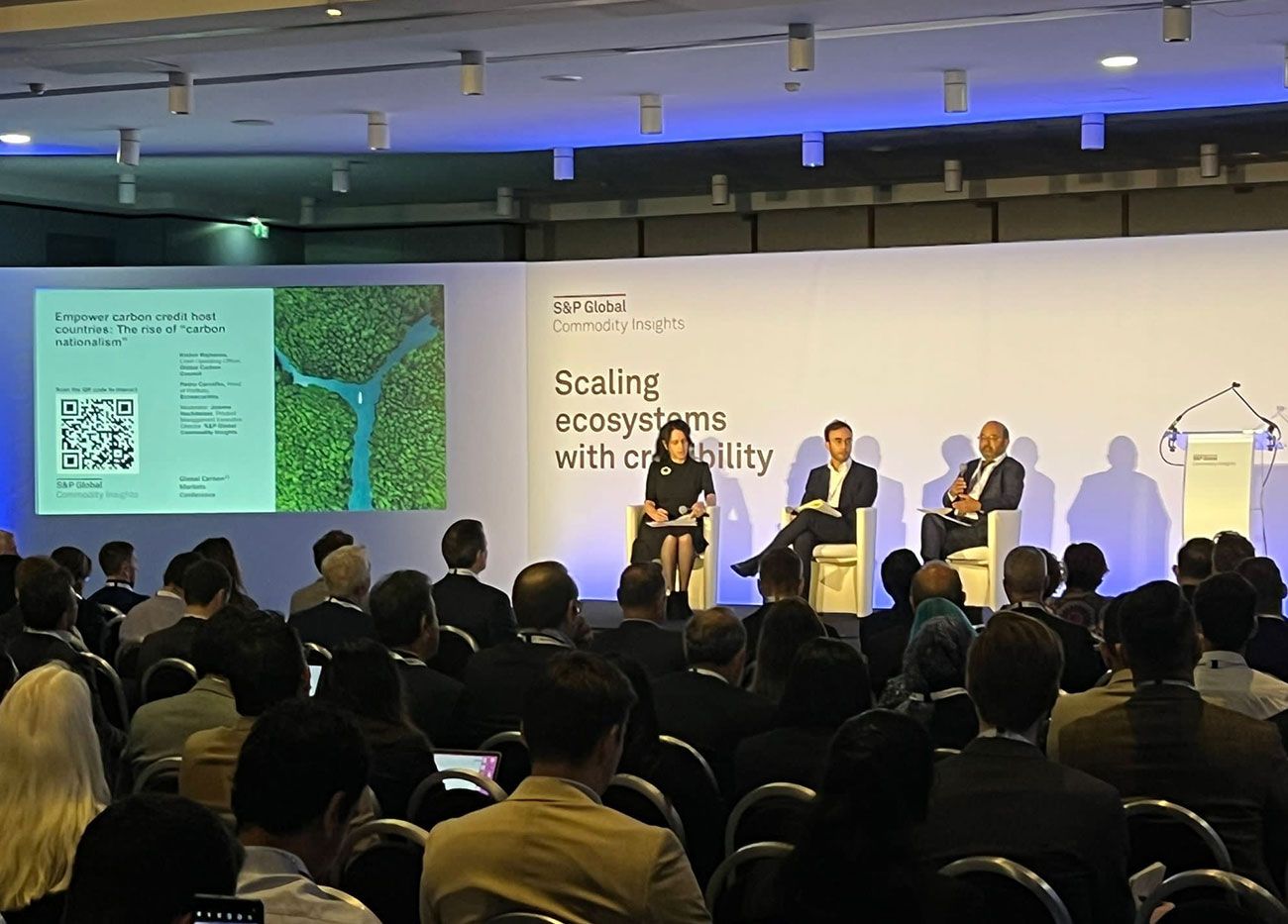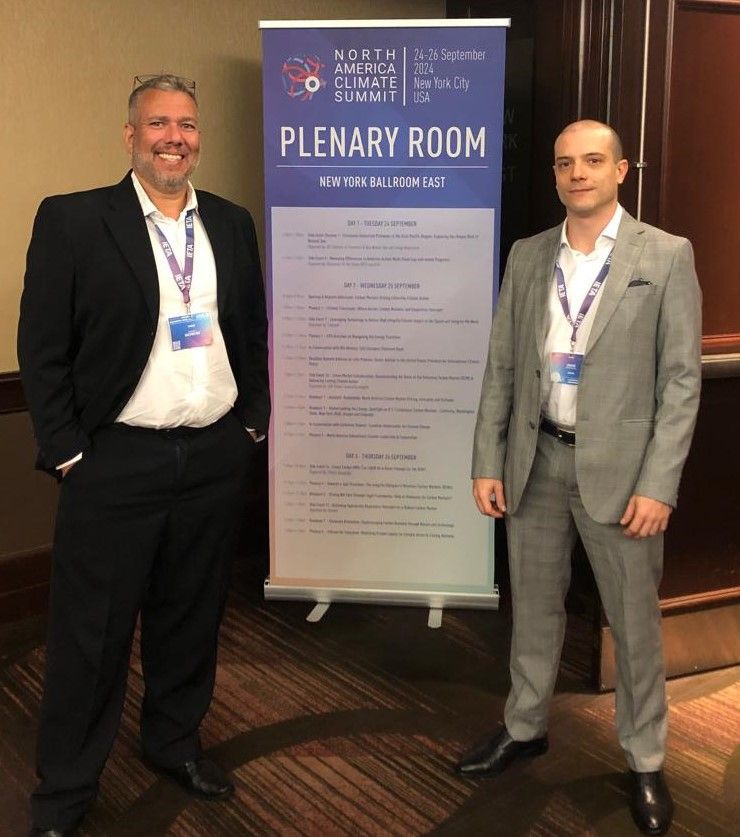Decoding Carbon Nationalism and Article 6 at S&P Global's Carbon Markets Conference

Decoding Carbon Nationalism and Article 6 at S&P Global’s Carbon Markets Conference
In the heart of Paris, France, the S&P Global 2nd Annual Carbon Markets Conference set the stage for an intellectually stimulating Fireside Chat. In this engaging conversation, two eminent figures, Pedro Carvalho, the Head of Portfolio at Ecosecurities, and Kishor Rajhansa, the Chief Operations Officer at the Global Carbon Council (GCC), delved into the resurgence of carbon nationalism and its profound influence on the intricate world of Article 6 within the global carbon credit market.
Deciphering the Enigma of Carbon Nationalism: Carbon nationalism has transcended into a pivotal theme in the realm of climate action. It symbolizes the practice of nations diligently safeguarding their carbon credits and emissions reductions within their sovereign boundaries, and adopting national practices to issue and track carbon units. This concept has, over time, attained prominence as nations confront the complexities woven into Article 6—a market-based mechanism that holds paramount significance in the pursuit of the Paris Agreement’s noble objectives for mitigating climate change.
The Intricacies of Carbon Credit Export
In the Fireside Chat, valuable insights were shared into the labyrinthine landscape of carbon credit export. As highlighted by Kishor Rajhansa, countries are categorically classified into three distinctive groups, each facing unique challenges in the use of carbon market to support climate actions and NDCs:
- Host Countries with Unconditional Commitments in NDCs: These nations have made significant unconditional commitments to fulfill their Nationally Determined Contributions (NDC) targets. Yet, they remain reticent about partaking in carbon markets, gripped by the fear of falling short of their NDC goals and the consequent absence of surplus credits for trade. A prime example is India, which has identified 13 sectors fraught with formidable implementation challenges.
- Host Countries with Pivotal Conditional Commitments: Certain countries such as LDCs over the years have placed their faith in international climate finance commitments pledged by developed nations to finance climate actions and sustainable development. Regrettably, these commitments have exhibited inconsistency in materializing, sowing seeds of doubt on the availability of such finance. These countries now mainly look at the support of carbon markets to fulfill conditional NDCs, which may produce excess emission reductions/removals that may be exported as ITMOs as they meet the high integrity definition of buying countries.
- Acquiring (or buying) Countries with Conditional NDCs: Acquiring countries particularly Western nations, find themselves ensnared by the absence of a clearly defined role within their NDC targets that is driven by the pursuit of carbon market support.
The landscape of carbon markets is fraught with political intricacies. Some developed nations exhibit an unwavering reluctance to rely on carbon finance as a means to achieve conditional targets. This reluctance exerts a palpable influence on the demand for carbon credits. In some instances, the preference appears to be leaning towards non-compliance with conditional targets, choosing inaction over partial attainment—a decision fraught with missed climate actions and their co-benefits.
Strategies for Triumph
To elegantly navigate these complexities, an array of essential elements were underscored:
- Robust GHG Inventories: A comprehensive greenhouse gas (GHG) inventory is the cornerstone of tracking and trading carbon credits.
- Visionary Climate Action Plans: Delineated climate action plans are indispensable for comprehending the trajectory of emissions reductions.
- Unveiling the Business-as-Usual (BAU) Trajectories: The establishment of BAU trajectories is pivotal for the benchmarking of emissions reductions.
- National Monitoring, Reporting, and Verification (MRV): A sophisticated MRV system is non-negotiable for tracking and validating carbon credits.
- A Well-Defined Policy Framework: The presence of a well-crafted policy framework with a clear and definite role of carbon market support serves as the North Star guiding carbon market activities.
- The voyage towards NDC attainment demands a crystalline vision of how targets will be met year by year. Different approaches can be undertaken for the authorization of carbon credit export, taking into account various considerations such as marginal abatement cost and market demand.
- Capacity Building, internationally recognized methodologies, robust governance structures, corresponding adjustments, and unimpeachable tracking of mitigation outcomes were emphasized to ensure the unassailable integrity of the carbon credit market.
- Article 6.4 negotiations on methodological framework must find a pragmatic balance between integrity and operability.
- The countries embracing Article 6.2, may wish to pay more attention to the development and implementation of climate policy, climate action, and climate finance schemes in the country/region. However, in the spirit of ensuring efficiency, quality, and independence of the mechanism, countries may wish to outsource the work of building carbon registry, registration of credible mitigation activities, and issuance of high integrity carbon credits and ITMOs to recognized independent GHG standards.
- The role of the private sector is very valuable in meeting the gap in demand for ITMOs. Use of Article 6.2 ITMOs by corporates for international mitigation purposes brings net mitigation in the context of global stocktake.
- Most importantly, political will for potential solutions in shaping the Article 6 landscape is supreme. These solutions encompass grand collaborations, caps for noble initiatives, the acceptance of realities, and the incursion of the private sector.
Gazing into the Future
As the world marches toward COP28, scheduled in the coming weeks, there is an encouraging surge in readiness support for host countries preparing to engage in Article 6. However, the quintessential challenges persist on the political front. Until these political aspects are harmoniously addressed, the supply of carbon credits may not be sufficiently fluid, impeding the realization of the market’s potential.
The Fireside Chat unveiled the multifaceted world of carbon nationalism, Article 6, and the global carbon credit market. It underscored the intricate and nuanced nature of international carbon trading, emphasizing the indispensable role of collaboration, innovation, double accounting, and political solutions in advancing climate action.
The path to a sustainable future is winding and demanding, but as these luminaries have shown, it is navigable with astute strategies, global cooperation, and an unwavering commitment to making a transformative impact.






